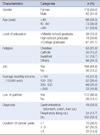Abstract
Purpose
This descriptive study was conducted to investigate awareness and attitudes toward 'Do-Not-Resuscitate (DNR)'.
Methods
Study data were collected from July 24 to September 30, 2011 using structured questionnaires. Study subjects were 209 patients suffering from cancer at "C" Univ. hospital located in Seoul and Cancer Patient Coalition in Seoul. The purpose of the study was explained directly to them. All the data of 209 questionnaires were collected and analyzed without dropping out.
Results
In terms of awareness toward DNR, 61.5% said DNR is "necessary" because "their recoveries are impossible" (51.7%) and "they want dignified deaths" (41.1%). When it comes to ethical attitudes toward DNR according to demographic characteristics, there were significant differences both between genders (p<.032) on "Medical staff should tell hopeless patients their conditions openly" and between level of education and monthly income (p<.013) on "DNR decision should be made according to the guideline, if needed".
Conclusion
The result of this study suggests that decisions on DNR should be made not by only families and doctors but by patients themselves as well. For this, sufficient explanations and education programs for DNR need to be developed and DNR decision including both patient's and family's demand should be standardized.
References
1. Jung KW, Park SH, Kong HJ, Won YJ, Lee JY, Seo HG, et al. Cancer Statistics in Korea: incidence, mortality, survival, and prevalence in 2009. Cancer Res Treat. 2012; 44(1):11–24.

2. Han YR, Kim IH. Attitude toward death and recognition of hospice of community dwellers. J Korean Acad Public Health Nurs. 2008; 22(1):49–61.
3. Kang KA. Reliability and validity of the suffering scale of family of patients with terminal cancer. J Korean Oncol Nurs. 2011; 11(1):49–57.

4. Han EK. Attitudes and perceptions on DNR among older adults and the caregivers [dissertation]. Seoul: Hanyang Univ.;2010.
5. McAdam C, Barton A, Bull P, Rai G. An audit of nurses' views on DNR decisions in 1989 and 2003. Br J Nurs. 2005; 14(20):1061–1062. 1064–1065.

6. Menkin ES, Weissman DE. DNR discussions: right method, wrong message. J Hosp Med. 2007; 2(1):49–50.

7. Grudzen CR, Koenig WJ, Hoffman JR, Boscardin WJ, Lorenz KA, Asch SM. Potential impact of a verbal prehospital DNR policy. Prehosp Emerg Care. 2009; 13(2):169–172.

8. Scripko PD, Greer DM. Practical considerations for reviving the CPR/DNR conversation. Am J Bioeth. 2010; 10(1):74–75.

9. Eliott JA, Olver I. Dying cancer patients talk about physician and patient roles in DNR decision making. Health Expect. 2011; 14(2):147–158.

10. Kang HI. Awareness and experience of nurses and physicians on DNR [dissertation]. Chuncheon: Hallym Univ.;2003.
11. Sun DS. The Recognition towards advance directives in hospice cancer patients and medical doctors [dissertation]. Seoul: Catholic Univ.;2008.
12. Chang CY. A Study of the attitude toward withholding life-sustaining treatment and the characteristics of cancer patient family: focusing on Do-Not-Resuscitate [dissertation]. Seoul: Catholic Univ.;2010.
13. Han SS, Kim JH, Moon IS, Yong JS. Proposal of "request and order form" of Do Not Resuscitate (DNR). J Korean Bioethics Assoc. 2005; 6(1):49–67.
14. Han SS, Jung SA, Moon MS, Han MH, Ko KH. Nurses' understanding and attitude on DNR. J Korean Acad Nurs Adm. 2001; 7(3):403–414.
15. Kang HI, Yom YH. Awareness and experience of nurses and physicians on DNR. J Korean Acad Nurs Adm. 2003; 9(3):447–458.
16. Lee SH, Kim JS, Hwang MJ, Hwang BD, Park YJ. Ethical dilemma associated with DNR: the attitude of clinical nurse. Clin Nurs Res. 1999; 4(1):147–162.
17. Han SS. Nature of ethical dilemmas and decision making in hospital nursing practice [dissertation]. Seoul: Seoul National Univ.;1992.
18. Sung MH, Park JH, Jung KE, Han HR. ICU nurses' awareness and attitudes to the ethical dilemma associated with DNR. Clin Nurs Res. 2007; 13(3):109–122.
19. Jeon MH. Nurse's awareness on the DNR orders for the elderly [dissertation]. Seoul: Hanyang Univ.;2008.
20. Lee YB. Nurses' and doctors' perception, experiences, and ethical attitudes on DNR. Clin Nurs Res. 2007; 13(2):73–85.
21. Kim SA. Ethical attitudes and perception of DNR for the elderly among nurses, patient family & caregiver [dissertation]. Seoul: Hanyang Univ.;2009.
22. Song KO, Jo HS. Ethical awareness and attitudes of patients' families towards DNR (Do-Not-Resuscitate). J Korean Clin Nurs Res. 2010; 16(3):73–84.
23. Jezewski MA. Do-not-resuscitate ststus; conflict and culture brokering in critical care unit. Heart Lung. 1994; 23(6):458–465.
24. Song T, Kim KP, Ko YS. Factors determining the establishment of DNR orders in oncologic patients at a university hospital in Korea. Korean J Med. 2008; 74(4):403–410.
25. Sohn MS. Ethical and legality of ceasing a medical treatment. J Korean Med Assoc. 1998; 41(7):707–711.
26. Ko HJ. A study on ethical attitude of nurses about do-not-resuscitate (DNR) and change in nursing activities after DNR decision [dissertation]. Gwangju: Chosun Univ.;2004.
27. Park HY. Awarness and ethical attitudes about DNR of emergency departments' team [dissertation]. Gyeongsangnam-do: Inje Univ.;2010.
28. Huh DS. Present and future of cancer treatment in Korea. Cancer Symposium. 2006; 2:29–34.




 PDF
PDF ePub
ePub Citation
Citation Print
Print







 XML Download
XML Download